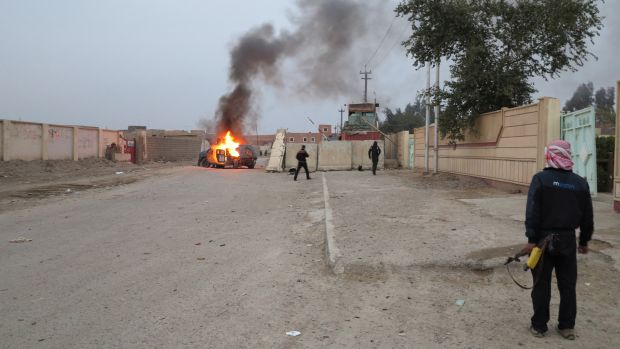
Protesters burn a police vehicle during the fighting in Ramadi December 31, 2013. (REUTERS/Ali al-Mashhadani)
Baghdad, Asharq Al-Awsat—Iraqi Prime Minister Nuri Al-Maliki ordered the army to withdraw from Anbar Province on Tuesday in response to demands by residents and his political opponents.
Maliki issued a statement on Tuesday which said: “The government, in cooperation with the Anbar local government, tribal leaders and clerics, has responded to the demands by ending the protests peacefully, without spilling a drop of blood.”
Amid mounting sectarian violence across Iraq stoked by the conflict in neighboring Syria, the western province of Anbar has been the scene of a long-running protest against the central government in Baghdad, with thousands of Sunni Iraqis occupying squares in cities such as Ramadi, for what they say is discrimination against members of their sect by the security forces.
Tensions worsened on Monday when police and army units moved in to dismantle a protest camp in Ramadi, leading to exchanges of gunfire that left around a dozen people dead. This followed the arrest of a prominent Sunni politician, Ahmed Al-Alwani, over the weekend, leading 40 Sunni MPs to resign in protest and call for his release.
This came despite a statement from Baghdad that it had reached an agreement with protest leaders on Sunday to end the sit-ins.
Maliki praised the role played by Acting Defense Minister Saadoun Al-Dulaimi and Anbar Council members and said it was important for the armed forces to “focus their attention on fighting Al-Qaeda in the Anbar desert and leave the administration of cities to the local police forces, following the success of ending the protests.”
Maliki said: “Calls by the tribal leaders, clerics and local government, had reached the level of cries of help that the protest areas had become a source of concern to the residents, and had fallen under the control of terrorists who wanted to impose their way of life on the province.”
He added: “We will direct all the efforts of the ministries to provide all needed services and repair the highway bridges which Al-Qaeda destroyed. We will also provide protection for travelers and open international borders around the clock for passengers and goods, in order to revive the economy.”
Maliki concluded his statement by calling on political adversaries to “make wise decisions which are not influenced by events, and to avoid stances which served the interest of Al-Qaeda, terrorism and sectarians.”
He also called on Sunni MPs to “abandon the idea of withdrawing from government and parliament, which has exhausted the state and deprived the citizens of the services they needed.”
Meanwhile, the Mutahidoun parliamentary bloc, led by the speaker of the parliament, Osama Al-Nujaifi, announced its satisfaction with Maliki’s decision to withdraw the army from Anbar cities.
Mutahidoun spokesman Zafir Al-Ani, told Asharq Al-Awsat: “The step taken by the prime minister on this issue is in our view the correct one. It is better that things come late than never happening at all.”
Ani added: “Although we value this step, there are two more demands which are no less important. They are the release of MP Ahmed Al-Alwani or to transfer his case to Anbar as the area concerned with his case, and the second is to deal seriously with the demands of protesters.”
In a related issue, the National Dialogue Front (NDF) led by deputy prime minister for services affairs Saleh Al-Mutlaq, has confirmed its support for Maliki’s decision to hand over the security dossier to the local police force in Anbar.
Mohannad Hussam Al-Din, member of the political bureau of the NDF, told Asharq Al-Awsat: “What happened in the recent past was an attempt to confuse the issues of pursuing members of Al-Qaeda and dealing with the protesters, and the mistakes made in this regard by field commanders have required correctional steps to be taken by the political leaders.”
